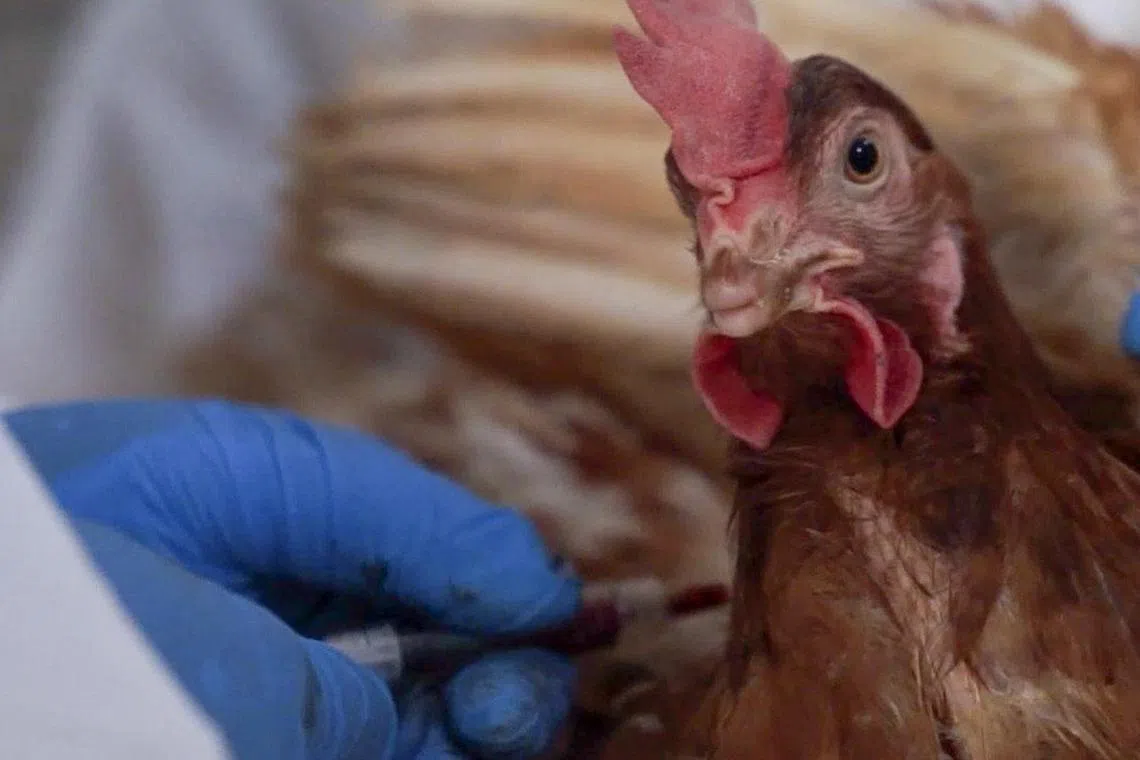Bird flu outbreak that sent egg prices soaring in Europe, US threatens to spread in South America
Sign up now: Get ST's newsletters delivered to your inbox

Just over 100 million poultry have died or were culled due to avian influenza between the start of October 2022 and Feb 3.
PHOTO: AFP
Follow topic:
BRASILIA, Brazil – Egg prices have soared due to the worst-ever global bird flu outbreak that has ravaged poultry flocks in Europe and the United States. Now, the disease is showing early signs of spreading in South America, endangering global chicken supplies.
Cases have been popping up in countries like Ecuador, Colombia and Bolivia. This week, in Argentina, the virus was detected in a wild bird. And more alarmingly, on Wednesday, Uruguay reported its first case of avian influenza. That shows bird flu is rapidly getting closer to Brazil, the world’s biggest chicken exporter.
Singapore imported 48 per cent of its 214,400 tonne chicken supply from Brazil in 2021, according to Singapore Food Agency statistics, making the South American country the Republic’s largest source of imported chicken.
While Brazil is still flu-free, a large outbreak in the country would likely have devastating consequences on global meat supplies. Even as food inflation has tamed in recent months, egg prices have bucked the trend because of bird flu.
Chicken could follow suit if flu impacts poultry flocks in Brazil, the world’s second-biggest producer, trailing the US. Exports from Brazil have jumped to record levels as the country filled the supply gap left by other producers that were hit by the flu.
The Uruguayan case is the closest to Brazil that has been reported so far, according to Brazil’s Agriculture Minister Carlos Favaro, adding that the nation is stepping up monitoring efforts and reinforcing security at its borders.
“Brazil hasn’t reported any cases so far, but the latest episode, which is 180km far from its border with Uruguay, is increasing our vigilance,” Mr Favaro said on Wednesday.
The transmission risk in South America is currently at a seasonal peak and will remain high through May, because of bird migratory patterns.
Brazil’s chicken exporter group, ABPA, said it is monitoring the situation after the Uruguay case. Biosecurity protocols in the country are high. Visits to farms and production units are banned, and there are other safety protocols, such as disinfecting vehicles.
Just over 100 million poultry have died or were culled due to avian influenza between the start of October 2022 and Feb 3, according to the World Organisation for Animal Health.
That is more than triple the number in the same period in the previous season, which ended with record losses from the disease.
Egg-laying hens have been among the hardest hit, boosting prices of the grocery staple and squeezing consumers. In the US, egg prices in January were up 70 per cent from a year earlier, the steepest 12-month rise in four decades.
When contacted, a Singapore Food Agency (SFA) spokesman said: “Currently, we have 25 import sources (of chicken). While our overall supply of chicken is currently stable, we can expect supply fluctuations from time to time due to disease outbreaks and supply disruptions.
“For instance, several countries are affected by bird flu outbreaks which affected their poultry production.”
The agency added that all imported poultry and poultry products, including eggs, must come from sources accredited by SFA. As part of accreditation, SFA assesses the countries to ensure they have measures to make sure exported poultry, poultry products and eggs are free of high pathogenicity avian influenza (HPAI).
“SFA also monitors worldwide outbreaks of HPAI, and suspends import from regions affected by HPAI, or only allows products that have been heat-treated to inactivate the HPAI virus,” added the spokesman.
BLOOMBERG

